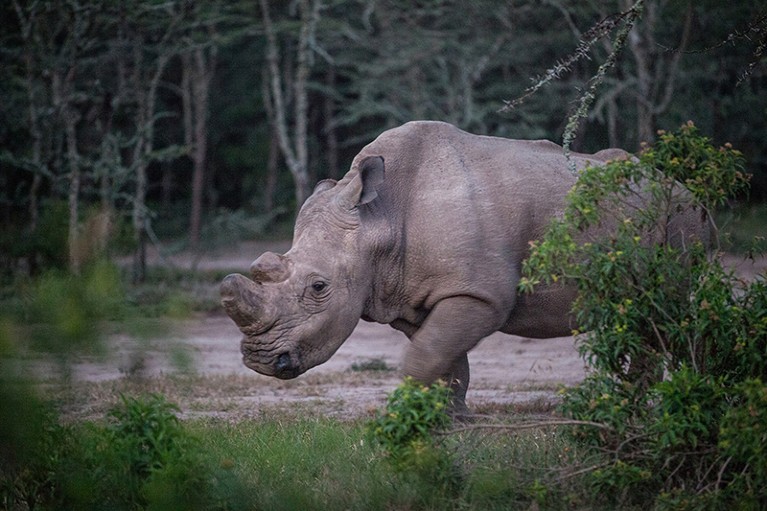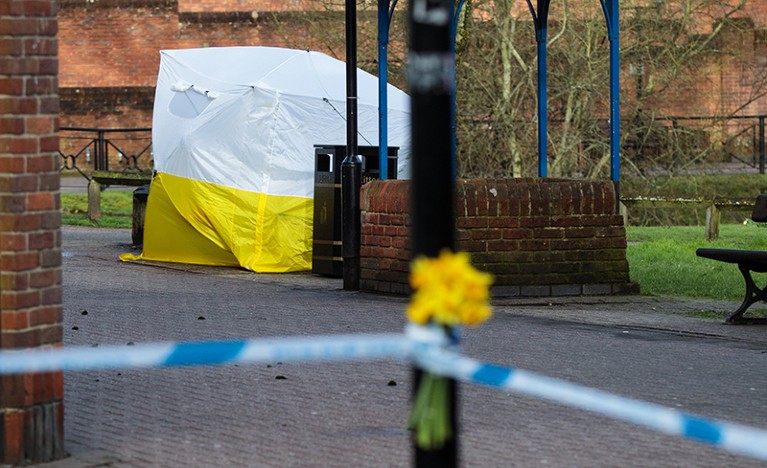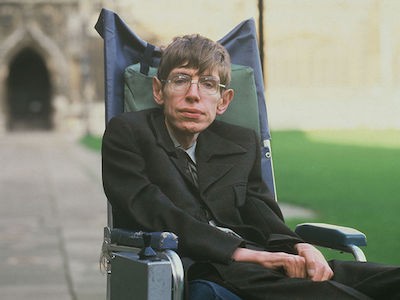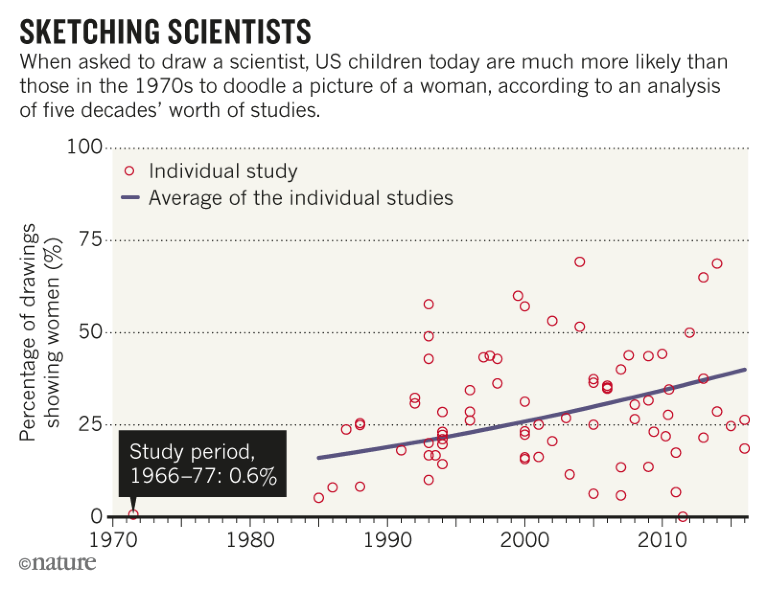CONSERVATION
Last male northern white rhino dies The northern white rhinoceros (Ceratotherium simum cottoni) is on the cusp of extinction after the last male of the subspecies died on 19 March. Just two females are now left. The 45-year-old male, named Sudan (pictured), had age-related muscle, bone and skin ailments that worsened before veterinary surgeons at the Ol Pejeta Conservancy in Kenya humanely killed him. The last surviving females, Najin and Fatu, are Sudan’s daughter and granddaughter, respectively. Conservationists are attempting a plan to save the subspecies using in vitro fertilization and, possibly, stem-cell technologies, but numerous hurdles remain.

Sudan, the last male northern white rhino on the planet, has died.Credit: Nichole Sobecki for The Washington Post via Getty
ASTRONOMY
Pulsars detected China’s flagship radio telescope, the Five-hundred-meter Aperture Spherical Telescope (FAST), has discovered 11 pulsars since it opened in September 2016. The National Astronomical Observatories of China announced the discoveries on 13 March, after observatories in other countries had confirmed the objects. Pulsars are compact, highly magnetized stars that rotate rapidly. The Chinese telescope is the largest in the world and is built in a natural depression among karst mountains in China’s southern Guizhou Province. So far it has identified 51 pulsar candidates, of which 11 have been confirmed. The observatory will also be used to map interstellar gas and search for extraterrestrial intelligence.
AWARDS
Maths prize Canadian mathematician Robert Langlands won the 2018 Abel Prize on 20 March, for discovering surprising connections between algebra, number theory and analysis. In 1967, Langlands proposed a sort of Rosetta stone for mathematics that allows researchers to translate between different fields. Langlands, now 81 and at the Institute for Advanced Study in Princeton, New Jersey, later found rigorous proofs for parts of this ‘dictionary’. Other mathematicians greatly broadened the scope of what has become known as the Langlands program. The annual Abel Prize for scientific work in mathematics, awarded by the Norwegian Academy of Science and Letters, comes with an award of 6 million kroner (US$777,000).
POLICY
Nicotine proposal On 15 March, the US Food and Drug Administration (FDA) took a step towards lowering the legal limit of nicotine in cigarettes. The agency announced last year that it was considering the measure as a way to reduce smoking, and it has now released a proposed rule that would cut nicotine in cigarettes to a “minimally addictive or nonaddictive” level. Models co-authored by FDA researchers and published on 15 March predict that by 2060, such a policy shift could prevent 16 million people who otherwise would have become smokers from taking up the habit (B. J. Apelberg et al. N. Engl. J. Med. http://doi.org/cmmv; 2018). The proposal is open for public comment until 14 June.
Experimental drugs On 13 March, the US House of Representatives voted down a controversial bill that would have allowed critically ill people to request experimental medicines without first consulting the US Food and Drug Administration (FDA). The Senate unanimously approved a version of the ‘right to try’ legislation last year, and President Donald Trump endorsed it during his State of the Union address in January. But some medical groups and patient advocates expressed concerns that the measure would offer false hope and put patients at risk. They also pointed out that the FDA already has a programme through which physicians can ask the agency to let a patient try an experimental drug — and that the vast majority of those requests are granted.
CLIMATE
Climate lawsuit An environmental group sued the US Department of State on 13 March to obtain records regarding an overdue report on national efforts to prevent global warming. The United States missed a January deadline to file its Climate Action Report with the United Nations, as required every four years under the 1992 UN Framework Convention on Climate Change (UNFCCC). The Center for Biological Diversity in Tuscon, Arizona, filed the lawsuit in federal court after the State Department failed to respond to requests concerning the report under the Freedom of Information Act. Although US President Donald Trump has decided to withdraw the country from the Paris climate agreement, the State Department remains legally bound to its UNFCCC commitments.
EVENTS
Spy poisoning International chemical-weapons specialists arrived in Britain this week to investigate the poisoning of a former Russian spy and his daughter in Salisbury on 4 March (pictured, a forensics tent near where the couple were found). The pair remain critically ill. The UK government says that its defence laboratory in nearby Porton Down found that a military-grade nerve agent of a class developed by Russia was used in the attack. The specialists are from the Organisation for the Prohibition of Chemical Weapons (OPCW) in The Hague; independent verification of the chemical involved is crucial, say experts, and the OPCW is the only body that can do this. In response to the incident, the government said on 15 March that it will invest £48 million to create a Chemical Weapons Defence Centre at Porton Down. Over the past decade, the lab’s funding and staff had been cut as part of government austerity measures.

A forensics tent covers the bench in Salisbury, UK, on which a Russian spy and his daughter were found suffering the effects of an apparent nerve-agent attack in March.Credit: Jack Taylor/Getty
Autumn bushfires Wildfires have destroyed dozens of homes in Australia this week, fanned by hot, dry winds that put tracts of the country’s southeast on bushfire alert. A fire around the coastal township of Tathra in New South Wales has razed about 70 homes since 18 March. Four separate bushfires in the southwest of the state of Victoria have so far destroyed 18 homes and killed hundreds of beef and dairy cattle. At least one of those fires is thought to have been ignited by lightning strikes, after a long period of dry weather that has seen some regions experience 40 days without rain.
Aid attacks Militants ambushed health workers carrying out polio vaccinations in a remote region of northwestern Pakistan on 17 March, killing two people and seriously wounding two others. A faction of the Pakistani Taliban claimed responsibility for the attack, according to media reports. Pakistan is one of only three countries in which polio remains endemic, and the nation has attempted to stamp it out. But distrust of polio workers has risen since it was revealed in 2011 that the US Central Intelligence Agency had planted health workers in the nation to collect intelligence on the fugitive al-Qaeda leader Osama bin Laden.
Strike deal rejected Strikes at UK universities could resume, after the union that represents academics rejected a deal on pensions. Staff at more than 60 institutions walked out for 14 days over the past month in protest against changes to pension payouts that could cost them thousands of pounds a year in retirement. On 13 March, members of the University and College Union spurned an agreement made between the union and Universities UK, which represents the academic employers, after 6 days of talks. The union had announced on 8 March that it would schedule a further 14 days of strike action during the student exam period if a deal could not be reached.
BUSINESS
Theranos charges On 14 March, the US Securities and Exchange Commission (SEC) charged health-technology company Theranos, and its chief executive Elizabeth Holmes, with fraud. Theranos, based in Palo Alto, California, claimed that its blood analysers could perform a range of laboratory tests on just a few drops of blood, according to court documents. The SEC alleges that the company raised more than US$700 million from investors with false and misleading statements about its analysers and financial performance. As part of a settlement announced on 14 March, Holmes agreed to pay a US$500,000 fine, and to not serve as a director or officer of a publicly traded company for ten years. “Neither the Company nor Ms. Holmes admitted or denied any wrongdoing,” Theranos said in a statement.
Obituary: Stephen Hawking (1942–2018)
PEOPLE
Hawking dies Stephen Hawking, one of the world’s most celebrated scientists, died at his home in Cambridge, UK, on 14 March, aged 76. His death was marked by tributes the world over that celebrated his seminal contributions to cosmology and black-hole research, and his work as a popularizer of science. Hawking had lived with the degenerative condition amyotrophic lateral sclerosis since his twenties.
TREND WATCH
Roughly one-third of US children now sketch a woman when asked to draw a scientist — a major shift since the 1960s. In an analysis, psychologists combined the results of 78 ‘draw-a-scientist’ studies between 1966 and 2016, involving some 20,000 US kids from kindergarten to high school. In the 1960s and 1970s, 99.4% of children drew a male scientist; that dropped to an average of 72% between 1985 and 2016. By the 2010s, about one in three drawings portrayed a female scientist.

Source: D. I. Miller et al. Child Dev. http://doi.org/cmnr (2018)






